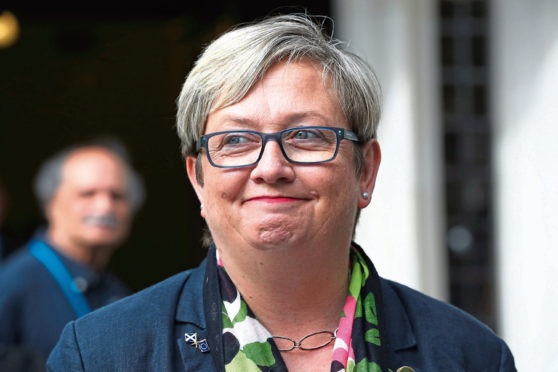Why did Nationalist MP Joanna Cherry choose this week to launch her latest bid for a wildcat independence referendum?
The dust has not yet settled on her party’s most recent embarrassment, with the downfall of Scottish Finance Secretary Derek Mackay still fresh in the headlines.
And in under a month, there will be a further unwelcome spotlight on the SNP when its former leader, Alex Salmond, appears in the High Court on 14 charges of sexual assault, including one of attempted rape, all of which he strenuously denies.
A period of quiet reflection would be advised for the upper echelons of the nationalist movement.
But Cherry is not the reflective type and, besides, if her aim is to destabilise the first minister, kicking her when she is down must seem like a good idea.
In demanding over the weekend that Holyrood bring forward legislation for a consultative referendum, the SNP’s Home Affairs spokesperson in Westminster is throwing down the gauntlet to Nicola Sturgeon.
The SNP leader has made it clear she would not go down the same route as Catalonia, in pushing ahead for an illegal vote on separation. Sturgeon’s decision was in response to Boris Johnson refusing to grant the Section 30 order that would enable another ballot on separation.
But Cherry, a QC, argues that an SNP Referendum Bill would be challenged by the UK Government and would inevitably lead to a courtroom confrontation.
“Boris Johnson should be put on notice that we have options and we are not afraid to push forward,” she insisted on Twitter.
The timing of a new referendum has opened up deep wounds in the party, with Sturgeon’s perceived timidity seized on by hardline activists.
Her days are widely believed to be numbered and members of her own party now talk openly about her successor – the favourite until last week being Derek Mackay.
Cherry may well consider herself a contender for the top job, and this is certainly not the first time she has undermined her boss.
Last autumn, she described Alex Salmond as the party’s greatest ever leader and she revealed that she had only ever sat down with Sturgeon once.
The fact that Cherry is picking a fight with the first minister now is a sign of Sturgeon’s increasing vulnerability, as well as of Joanna Cherry’s own vaunting ambition.
But other than jockeying for position as a future leader, what does she expect to achieve with a ploy that has no chance of success?
She must be spending too much time away from Scotland, or listening only to those whose views she shares.
Beyond her Nationalist echo chamber, there is still deep-rooted opposition to independence and no momentum to re-run the events of 2014, when the Yes movement lost its battle to break up Britain.
If the SNP staged an unsanctioned new ballot, large swathes of Scottish Unionists would boycott it.
What kind of a consultation would it be if a significant proportion of voters – maybe even a majority – opted not to participate in it?
Cherry’s consultative referendum would end up being like a show of hands at an SNP conference, no more conclusive than Nationalists talking to each other about something they have already agreed upon.
Furthermore, such an exercise would likely cost a fortune, at a time when Scotland’s finances are a poor advertisement for going it alone.
The country’s deficit – which the SNP tried to hide – is 7.2% of GDP, making it ineligible for EU membership even if all the other obstacles to secession had been overcome.
Having raided the coffers for another bout of Nationalist navel-gazing, Scotland would still be part of the UK, and there would be even fewer resources to devote to healthcare, schools, policing, transport and so on.
But if Nationalists stopped to think through the consequences of nationalism – Scotland plunged further into debt, unaffordable public services, ever-rising taxes draining the land of talent and potential, trade barriers with its biggest market – they wouldn’t be Nationalists.
Instead, they pursue their parallel universe agendas.
Sturgeon has been in Brussels this week, trying to negotiate Scotland’s re-entry into the EU as a separate state. One assumes the Europeans humour her out of courtesy, but they would not like it if their leaders abandoned pressing domestic duties to grandstand on the diplomatic stage.
Cherry is really no different.
She is courting followers for her personal crusade, not addressing the concerns of her country.
Surely, for both of these politicians, the path to winning over Unionists – whom they must enlist if they are to achieve their goal – lies in more practical measures.
Making Scotland a better place to live in for everyone, and representing national not just Nationalist interests, should be their top priority.
But it never will be and, as a result, their common cause is doomed to failure.
